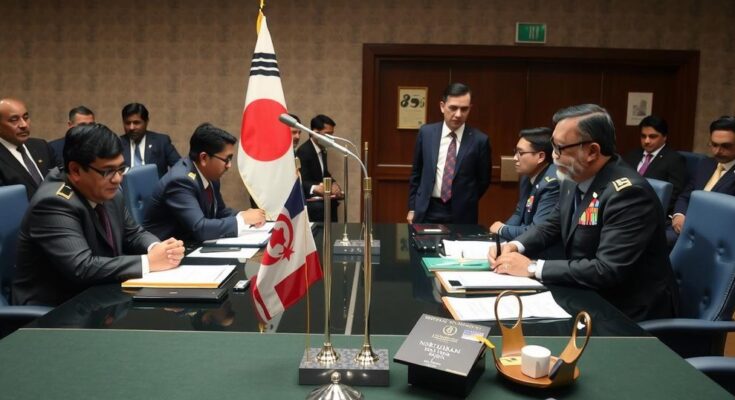Pakistan’s envoy to the UN hopes to enhance dialogue on North Korea during its new term as a nonpermanent Security Council member. Munir Akram emphasized the need for normalization discussions and underscored Pakistan’s commitment to nonproliferation. The article also highlights the complexities within the Security Council and Pakistan’s stance on nuclear weapons and international treaties.
Pakistan’s representative to the United Nations has expressed optimism regarding the possibility of revitalizing discussions on North Korea as the nation embarks on a two-year term as a nonpermanent member of the Security Council. During an interview with Kyodo News, Munir Akram articulated concerns over insufficient dialogue at the UN addressing the normalization of conditions on the Korean Peninsula, emphasizing the need to foster conversations that could alleviate regional tensions.
Ahead of a recent rotation in the council’s membership, Akram highlighted Pakistan’s transition to occupy the Asia-Pacific seat previously held by Japan, alongside the entry of Denmark, Greece, Panama, and Somalia as new nonpermanent members. Pakistan has a history of serving on the Security Council, with its last term occurring from 2012 to 2013.
As a nuclear-armed state with diplomatic ties to North Korea, Pakistan advocates for nonproliferation and calls for a universal ban on nuclear testing. When questioned about Pakistan’s stance on a possible seventh nuclear test by North Korea, Akram emphasized that its policy is guided by the principles of preventing nuclear proliferation.
The Security Council has faced mounting criticism for its inability to act decisively in response to global crises, particularly after the onset of Russia’s invasion of Ukraine. Akram noted that amid the existing divide among the council’s five permanent members—Britain, China, France, Russia, and the United States—nonpermanent members have a crucial role in bridging their differences to enhance the council’s efficacy.
Further reflecting on regional security, Akram expressed Pakistan’s desire for a nuclear weapon-free zone in South Asia, although he reiterated that support for the Treaty on the Prohibition of Nuclear Weapons remains untenable while India retains its nuclear capabilities. Despite the Treaty coming into force in 2021, several nuclear powers, including the United States and Japan, have opted not to join the initiative.
The article discusses Pakistan’s renewed commitment as a nonpermanent member of the United Nations Security Council, focusing on efforts to facilitate dialogue surrounding North Korea’s nuclear activities. It sheds light on the implications of Pakistan’s stance on nonproliferation and highlights the geopolitical dynamics within the Security Council, particularly the challenges posed by divisions among its permanent members. Furthermore, the article establishes the backdrop of Pakistan’s historical engagement with the Security Council and its viewpoint on creating stability in the South Asian nuclear landscape.
In summary, Pakistan’s envoy to the United Nations has reiterated the country’s commitment to reviving dialogue on North Korean issues as it begins a new term on the Security Council. Munir Akram’s remarks underscore Pakistan’s principled stance on nonproliferation and the critical need for collaboration among Security Council members to address global nuclear threats. The complexities of regional security in South Asia also emphasize the challenges Pakistan faces in advocating for disarmament in an environment marked by rival nuclear capabilities.
Original Source: english.kyodonews.net



